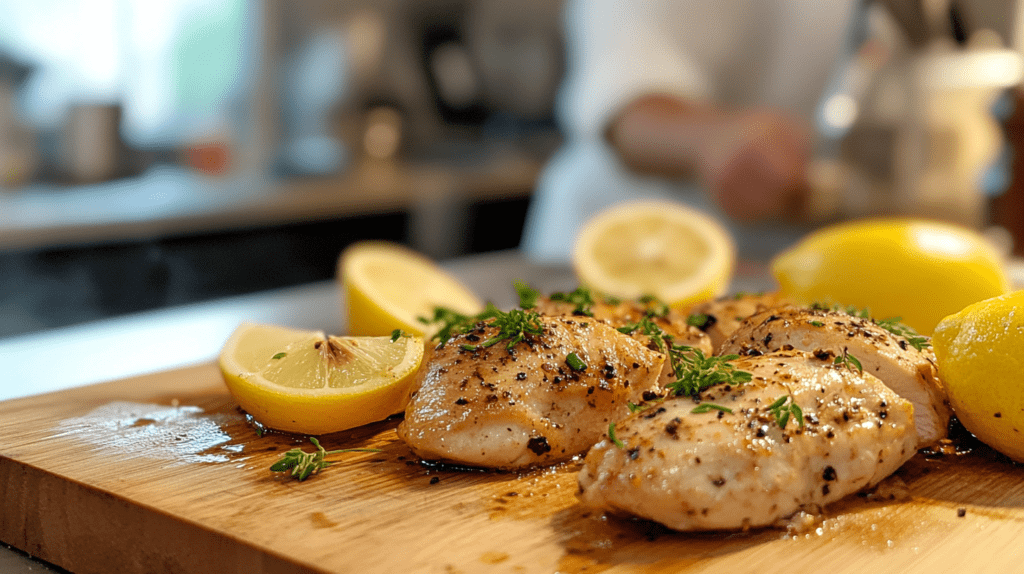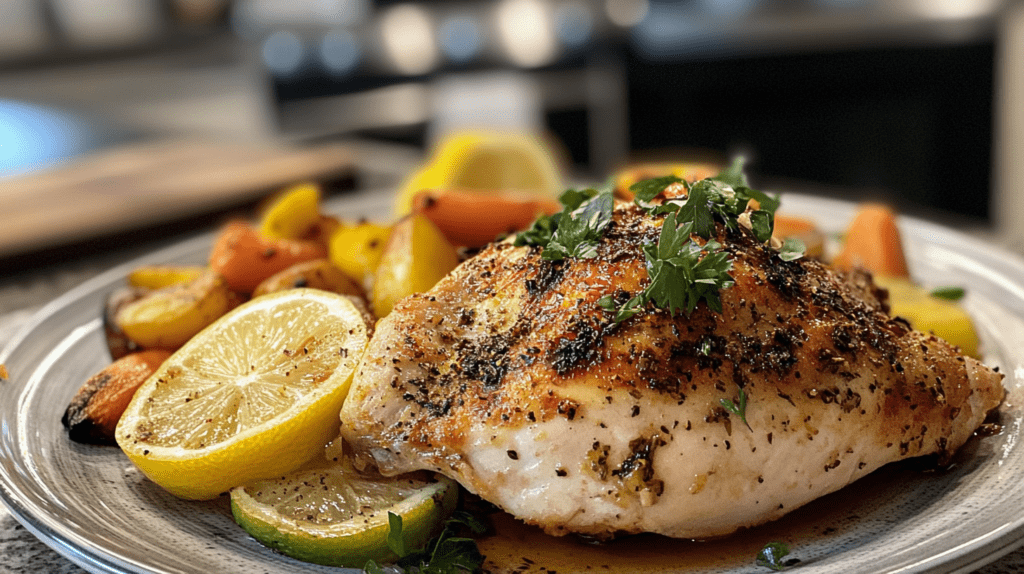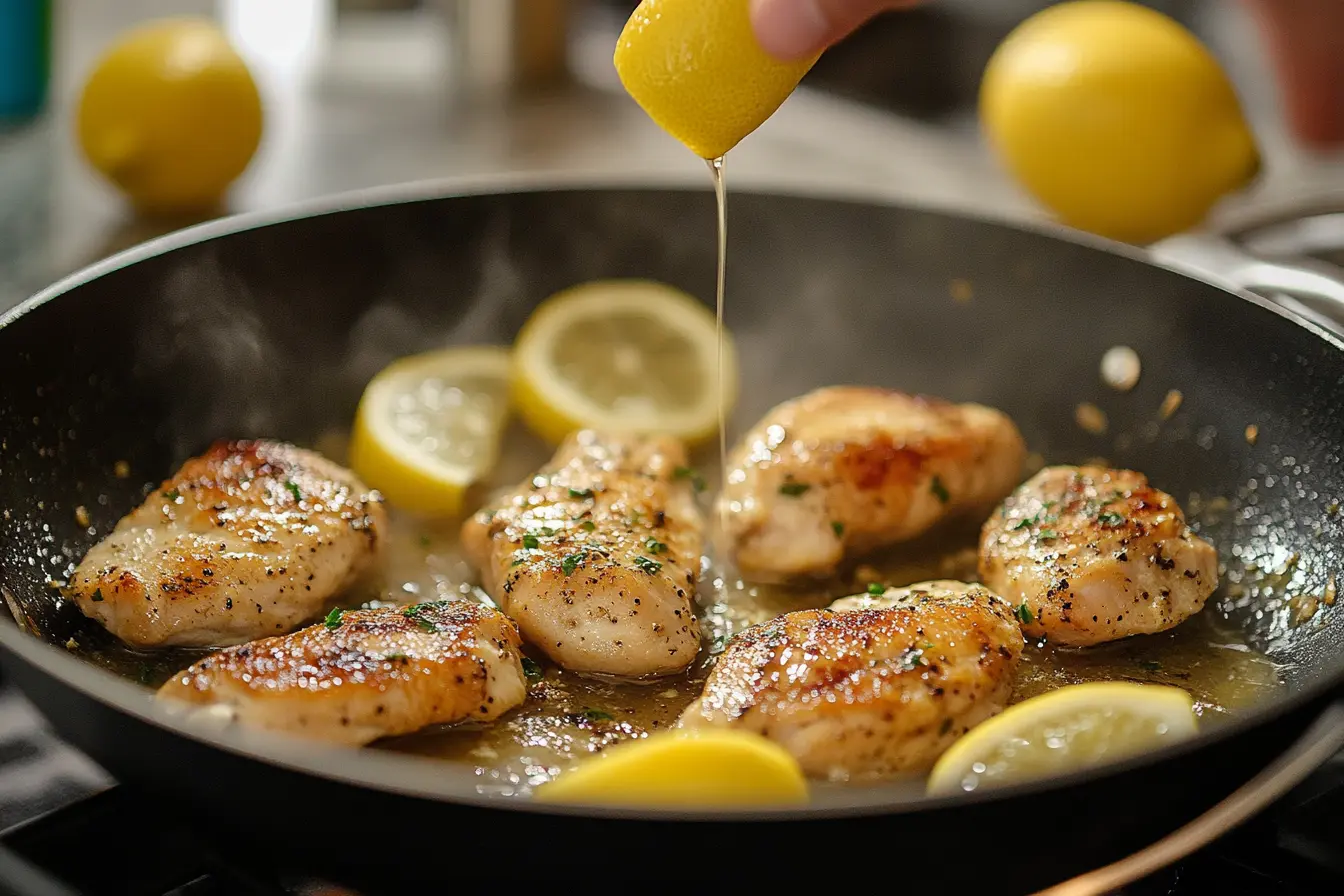Introduction
Cooking chicken can be an art, but timing is everything—especially when incorporating lemon juice. It’s not just about flavor; lemon juice has the power to tenderize, enhance, and preserve chicken in ways that elevate any dish. In this article, we’ll explore the best ways to use lemon juice when cooking chicken, including when to add it for optimal results. From marination tips to cooking techniques, we’ll also uncover common pitfalls and answer your most pressing questions about this versatile citrus addition.
Understanding Lemon Juice in Cooking
What is Lemon Juice and Why is it Used in Cooking?
Lemon juice, extracted from fresh lemons, is one of the most versatile ingredients in the kitchen. Its unique combination of tartness, acidity, and refreshing flavor makes it a staple for enhancing countless dishes. But why is it so essential in chicken recipes? The secret lies in its acidity. The natural acids in lemon juice break down proteins in chicken, making the meat tender and juicy while adding a zing of fresh flavor.
Aside from its flavor profile, lemon juice helps balance richness in heavy sauces or fatty chicken cuts. Its bright notes can transform a plain dish into a gourmet masterpiece. Beyond taste, it’s also a natural preservative, delaying spoilage thanks to its antibacterial properties. Whether it’s grilled, roasted, or baked chicken, a touch of lemon juice makes all the difference.
Nutritional and Flavor Profile of Lemon Juice
Lemon juice is not just about taste; it’s also packed with nutritional benefits. A single lemon provides a significant boost of vitamin C, which acts as an antioxidant. This helps enhance the immune system, reduce inflammation, and improve skin health. When paired with chicken, it not only delivers a delightful citrusy tang but also adds a subtle health kick.
From a flavor perspective, lemon juice is a balance of sweet and sour. Its high citric acid content makes it tangy, while the natural sugars in lemons prevent it from being overly sharp. These qualities make it a go-to ingredient for marinades, sauces, and finishing touches in countless chicken recipes. For those looking to explore healthier cooking methods, substituting heavy cream-based sauces with a lemon-based alternative can make dishes lighter yet flavorful.
Benefits of Adding Lemon Juice to Chicken Dishes
Enhancing Flavor with Lemon Juice
Lemon juice works wonders when it comes to elevating the flavor of chicken. Its zesty acidity complements the savory notes of the meat, creating a well-rounded taste that lingers on the palate. When used in marinades, it penetrates the chicken, infusing it with subtle citrus notes that enhance the overall dish.
Adding a squeeze of lemon juice toward the end of cooking can brighten the flavors of grilled, baked, or roasted chicken. It balances rich or heavy ingredients like butter or cream, preventing dishes from feeling overly indulgent. Lemon juice can even enhance simple spices like salt, garlic, or paprika, making the dish feel more complex without additional effort.
Tenderizing Chicken Using Lemon Juice
One of the most notable benefits of lemon juice is its ability to tenderize chicken. The citric acid in lemon juice helps break down proteins in the meat, which softens its texture. This process makes it easier for the chicken to absorb marinades, locking in flavor while ensuring it stays moist during cooking.
However, timing is crucial. Leaving chicken in a lemon-based marinade for too long can actually over-tenderize the meat, giving it a mushy texture instead of the desired juicy consistency. A marination time of 30 minutes to 2 hours is typically enough to achieve tender, flavorful chicken without compromising texture.
Balancing Acidity in Chicken Recipes
Acidity plays a vital role in creating harmony in a dish. Lemon juice provides a sharp, tangy counterpoint to the natural richness of chicken, balancing out heavy flavors. For example, dishes like creamy chicken Alfredo or chicken pot pie benefit from a touch of acidity to prevent them from feeling overly rich.
Moreover, when paired with savory spices like rosemary, thyme, or oregano, lemon juice adds layers of complexity that elevate the dish. If you’ve ever wondered why citrus-flavored chicken tastes so vibrant, it’s because lemon juice brings all the components together in perfect harmony.
Lemon Juice as a Natural Preservative
Beyond its culinary uses, lemon juice is also a natural preservative. Its antibacterial properties slow down spoilage, making it an excellent addition to leftover chicken recipes or meal prep plans. The acidity in lemon juice creates an environment that inhibits the growth of harmful bacteria, keeping your chicken fresher for longer.
Additionally, using lemon juice in marinades not only preserves but also helps maintain the chicken’s vibrant color, preventing it from turning gray or dull when stored. For cooks who value both taste and presentation, this is an invaluable benefit.
Timing Matters – When to Add Lemon Juice in Cooking Chicken
Adding Lemon Juice During Marination: Pros and Cons

Marinating chicken in lemon juice is a classic culinary technique. It infuses the meat with bright citrus notes and tenderizes it, making every bite succulent. The key lies in the acid from the lemon juice breaking down the muscle fibers in the chicken, which enhances both flavor and texture.
However, moderation is essential. While a marinade rich in lemon juice can work wonders, leaving chicken in it for too long—especially overnight—can cause the meat to become overly soft or mushy. Ideally, marinate chicken with lemon juice for 30 minutes to 2 hours. Pairing lemon juice with ingredients like olive oil, garlic, and herbs creates a balanced marinade that boosts flavor without overpowering the meat.
On the downside, lemon juice can also start “cooking” the chicken’s surface (similar to ceviche) if left for extended periods. This can lead to uneven texture during cooking. To avoid this, always keep marinated chicken refrigerated and stick to recommended times.
Adding Lemon Juice While Cooking: Best Practices
When it comes to cooking chicken, timing is everything. Adding lemon juice during the cooking process can enhance the dish, but it requires finesse. Adding it too early may reduce its flavor impact, as heat tends to dull the bright tanginess of lemon juice.
A great practice is to add lemon juice during the final stages of cooking. For example, when pan-frying chicken, you can deglaze the pan with lemon juice to create a flavorful sauce. In roasted chicken dishes, drizzling lemon juice over the meat just before serving keeps its vibrant flavor intact.
Another tip is to use lemon zest during cooking and reserve the juice for the end. The zest carries aromatic oils that can withstand heat better than the juice, adding a citrusy depth to the dish while the juice brings a fresh pop of flavor at the finish.
Using Lemon Juice After Cooking: Tips for Optimal Taste

Lemon juice truly shines as a finishing touch. Adding it after cooking ensures its freshness and acidity remain prominent, providing a burst of brightness that complements chicken’s natural savory tones.
For grilled chicken, a simple squeeze of fresh lemon juice enhances the smoky flavors, making them feel lighter and more balanced. When serving baked or fried chicken, lemon juice can be used as part of a dressing or glaze to give the dish a polished and professional touch.
One pro tip: combine lemon juice with a pinch of salt or drizzle it with olive oil to create a quick, flavorful dressing. This can be brushed onto chicken just before serving for added moisture and taste. For dishes served cold, such as chicken salads, lemon juice can double as a preservative and a flavor enhancer, ensuring the dish remains fresh and vibrant.
Culinary Techniques Involving Lemon Juice and Chicken
Popular Chicken Dishes Featuring Lemon Juice
Lemon juice takes center stage in numerous globally celebrated chicken recipes. Its ability to add zest and balance makes it indispensable in both traditional and modern cuisines. A classic example is lemon chicken, a dish that pairs tender chicken with a tangy lemon-based sauce, often enriched with garlic and herbs.
Mediterranean dishes like Greek chicken souvlaki highlight the combination of lemon juice, olive oil, and oregano, creating a marinade that produces succulent, flavorful kebabs. Similarly, Middle Eastern cuisines often use lemon juice in chicken shawarma marinades, contributing to its signature tangy flavor.
Asian-inspired lemon chicken recipes emphasize a balance of sweet, sour, and savory flavors. These dishes typically feature fried or stir-fried chicken coated in a glaze made from fresh lemon juice, sugar, and soy sauce. Regardless of the cuisine, lemon juice remains a cornerstone for enhancing both taste and aroma in chicken dishes.
Cooking Methods That Complement Lemon Juice
Some cooking methods pair exceptionally well with lemon juice to bring out the best in chicken.
- Grilling: The high heat of grilling caramelizes the sugars in the chicken and the lemon marinade, creating a smoky, tangy crust. Lemon juice also keeps the chicken moist, counteracting the drying effects of grilling.
- Roasting: Lemon juice can be used as part of a basting liquid for roasted chicken. Drizzling lemon juice over the chicken as it roasts allows the acid to seep into the meat, enhancing its juiciness and flavor. Adding lemon slices to the roasting pan creates aromatic steam that infuses the chicken further.
- Sautéing: A quick squeeze of lemon juice at the end of sautéing chicken creates a pan sauce that combines the citrus with the browned bits in the skillet, delivering an intense flavor boost.
- Steaming or Poaching: When chicken is steamed or poached, a dash of lemon juice can elevate its mild flavor. Adding it to the cooking liquid or finishing with fresh juice afterward keeps the dish light and refreshing.
These techniques highlight how lemon juice’s versatility can enhance chicken in almost any culinary style. Pairing it with the right method ensures the flavors shine without overpowering the dish.
Common Mistakes to Avoid
Overusing Lemon Juice and Its Effects on Texture
While lemon juice is a fantastic addition to chicken dishes, too much of a good thing can backfire. Overusing lemon juice, especially in marinades, can overwhelm the chicken, making it excessively tangy or sour. Beyond the flavor, its high acidity can break down the meat’s proteins too much, leading to an undesirable mushy texture.
To avoid this, balance the amount of lemon juice with other marinade ingredients like olive oil, honey, or yogurt. This creates a harmonious mixture that tenderizes and flavors without over-acidifying. Sticking to recommended marination times—typically no more than 2 hours—can also help you avoid any texture mishaps.
Misbalancing Flavors with Excessive Acidity
Acidity from lemon juice can enhance chicken, but too much can overshadow other flavors in the dish. For example, if a recipe relies heavily on savory herbs like thyme or rosemary, overusing lemon juice may mask these subtle flavors. Similarly, acidic sauces can clash with creamy or sweet ingredients, creating a dish that’s more confusing than delightful.
A simple trick to maintain balance is to start with a small amount of lemon juice and taste as you go. If the dish feels too acidic, add a pinch of sugar or a dollop of cream to round it out. Using lemon zest alongside the juice can also add citrusy brightness without tipping the flavor scales.
Avoiding Bitter Aftertaste from Lemon Zest
Lemon zest is packed with aromatic oils that add a vibrant citrus flavor, but it can also introduce bitterness if used incorrectly. The zest should only include the bright yellow layer of the peel; the white pith underneath is bitter and can ruin the flavor of your dish.
When zesting lemons, use a microplane or fine grater and stop before you reach the pith. Incorporate zest at the start of cooking to allow its flavors to meld with the other ingredients. If you’re using zest as a garnish, a light sprinkle over finished dishes can deliver freshness without bitterness.
FAQs
Does Lemon Juice Make Chicken Tough?
Lemon juice doesn’t make chicken tough if used correctly. Its natural acidity tenderizes chicken by breaking down its proteins. However, if chicken is left in a lemon-based marinade for too long, it can over-tenderize, resulting in a mushy texture. To avoid this, limit marination to 30 minutes to 2 hours for the best results.
Can You Marinate Chicken in Lemon Juice Overnight?
While marinating chicken overnight might seem convenient, it’s not ideal when using lemon juice. Prolonged exposure to lemon juice can lead to overly soft or even slimy meat due to its acidic properties. If you need to marinate overnight, reduce the amount of lemon juice and combine it with milder ingredients like yogurt or buttermilk to balance the acidity.
What are the Best Alternatives to Lemon Juice for Cooking Chicken?
If you don’t have lemon juice on hand, there are several substitutes you can use. Vinegar (such as apple cider or white vinegar) offers a similar tangy effect. Lime juice is another excellent alternative, providing a slightly sweeter citrus flavor. For those seeking a milder option, a splash of orange juice or a dollop of plain yogurt can also work well.
How Does Lemon Juice Affect Chicken’s Nutritional Value?
Lemon juice not only enhances flavor but also adds a nutritional boost to chicken dishes. It’s rich in vitamin C, which can improve immunity and aid digestion. However, the amount of lemon juice used is typically small, so its overall impact on nutritional value is minimal. Still, it’s a healthier alternative to heavy sauces or artificial flavorings.
Can You Substitute Bottled Lemon Juice for Fresh Lemon Juice?
Bottled lemon juice can be used as a substitute for fresh lemon juice, but the flavor may not be as vibrant. Fresh lemon juice contains aromatic oils that contribute to its bright, fresh taste, whereas bottled juice often contains preservatives that can dull its flavor. When possible, opt for fresh lemons to achieve the best results in your chicken recipes.
Conclusion
Incorporating lemon juice into chicken recipes is a simple yet transformative technique that elevates flavor, enhances texture, and adds a touch of zest to your dishes. Whether you’re marinating, cooking, or using it as a finishing touch, the timing and method of adding lemon juice are crucial to achieving the desired results.
From tenderizing chicken to balancing rich flavors and serving as a natural preservative, lemon juice is an indispensable ingredient in the kitchen. However, understanding its properties—like avoiding over-marination and balancing acidity—is key to unlocking its full potential without unintended mishaps.
By following the best practices and avoiding common mistakes, you can use lemon juice to create vibrant, mouthwatering chicken dishes that are sure to impress. Whether you’re making a classic lemon chicken, grilling with a zesty marinade, or simply squeezing fresh juice over a finished dish, this versatile citrus will always find its place in your cooking repertoire.
With these tips and techniques in mind, why not experiment with your next chicken dish and let lemon juice bring it to life?


1 thought on “When to Add Lemon Juice When Cooking Chicken: Best Practices and Tips”